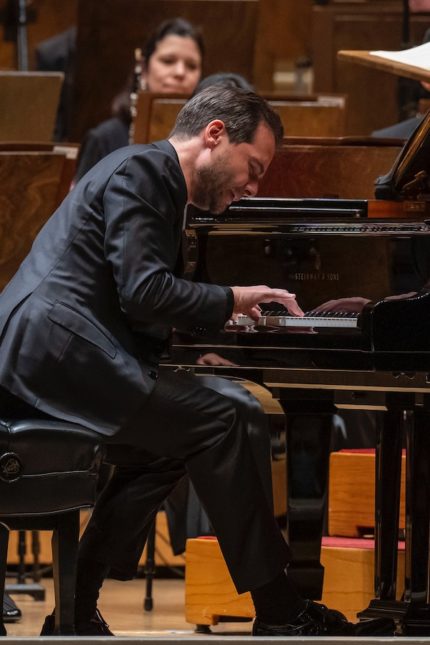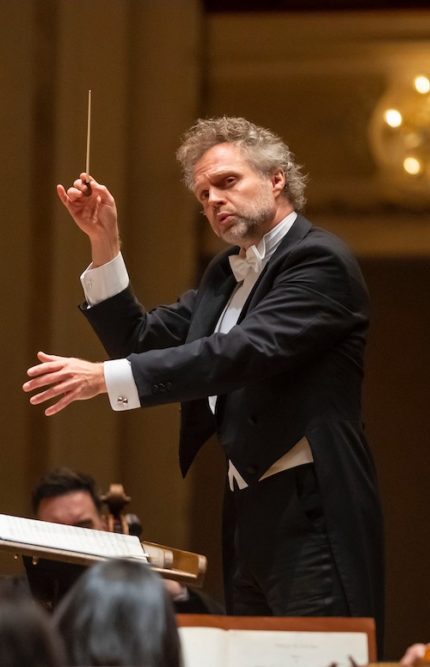Piemontesi shines in CSO debut, making familiar Beethoven fresh and fun

On Thursday night, the highlight of the evening’s Chicago Symphony Orchestra concert came as something of a surprise.
Most attention was focused on the return of conductor Thomas Søndergård, following a well-received CSO debut in 2018. Since then, the Danish conductor has been named music director of the Minnesota Orchestra, a post he will take up next fall.
Yet on this occasion, Søndergård’s direction proved decidedly mixed, and the evening clearly belonged to pianist Francesco Piemontesi who made a most impressive CSO debut.
Beethoven’s Piano Concerto No. 2 (the first to be written but never mind) is the least performed of his five works in the genre. The primary reason is a relative lack of flashy virtuosity, with Op. 19 having one leg in the Classical era and the other in a burgeoning Romanticism. The latter is most evident in the finale with the young Beethoven’s humor and off-the-beat accents in the main theme.
So, this is not a standard work in which a debuting soloist can easily make a bravura impression. Yet from his first entrance—after a rather humdrum orchestral introduction under Søndergård—Piemontesi immediately seized attention.
As solo protagonist, the handsome young Italian revealed himself a stylish and delightful keyboard presence. In addition to a stellar technique and clarity of articulation, Piemontesi brought a probing yet playful touch, adding a bit of emphasis here, a subtle slowing there, even a jazz-like top-spin at times. The cadenza of the opening movement became a small tone poem, with the pianist finding rare eloquence as he worked the solo passage into a Romantic cataclysm with Impressionistic touches.
In the Adagio, Piemontesi’s subtly shaded phrasing and dynamics bestowed a poised, searching expression. In the final bars, he drew out his lingering phrases in conversation with the orchestra, as if not quite ready to leave this peaceful reverie.
Piemontesi put the molto in Molto allegro in a scintillating Rondo finale, bringing verve and edgy urgency to music usually taken at a more genial pace. Perhaps some of his extra grace notes pushed the envelope at times, but he made every phrase register, making even the composer’s overfamiliar musical jokes fresh and genuinely funny. One felt as if experiencing something of what Beethoven’s keyboard style must have sounded like in the joy and quirky unpredictability of Pietmontesi’s playing.
One can’t say the same for Søndergård’s accompaniment, which was generalized in sturdy-Beethoven manner, and in need of a much firmer grip—ensemble issues and ragged phrase endings should have been fixed in rehearsal.
Piemontesi received a well-deserved standing ovation. The pianist responded to the repeated curtain calls with an individual choice of encore—the third of Szymanowski’s Four Studies, Op. 4 (Andante in modo d’una canzona), played with daunting fire and eloquence. Let’s hope this gifted pianist favors Chicago with another visit sooner rather than later.

The evening began in nonlinear fashion with choral music, Stravinsky’s Symphony of Psalms. While one is always grateful to hear Stravinsky, this was not a performance to make one appreciate the singularity nor the subtleties of this compelling work.
Stravinsky was a Christian believer for nearly all of his long life, yet the Russian composer’s settings of religious texts are characteristically bracing and nontraditional. The chosen texts in the Symphony of Psalms sing of supplication, salvation and praise, yet much of the music is angular, harsh and discordant, a fact emphasized by the percussive scoring (two pianos, large wind and brass sections with no violins or violas). At times the music almost seems to hearken back to the ritualistic paganism of Rite of Spring and Les Noces, though the finale’s soothing Alleluias provide belated consolatory balm.
Søndergård seemed to have a general grasp of the piece but Thursday night’s bombastic performance failed to convey Stravinsky’s compositional ingenuity or the variety of expression inherent in the score. The blaring brass, especially in the coda of the first movement, verged on painful.
The CSO Chorus—prepared by guest director Jean-Sébastien Vallée—was nimble in Stravinsky’s tricky rhythms and imbued the Alleuia with a rich and glowing sonority. But words were too often indecipherable and, at times, one would be hard put to know what language was being sung without the texts. The highlight of the performance came with the Bachian opening duo of the middle movement, elegantly rendered by principal oboist William Welter and new assistant flutist Yevgeny Faniuk.
Sibelius’s Symphony No. 2 closed the evening and here Søndergård seemed on a firmer footing. The Danish conductor led a well-paced performance, sensitive to the ebb and flow, drawing majestic brass playing and building inexorably to a resonant and triumphant finale. The musicians played well across all sections with Welter’s oboe solos seeming to single-handedly embody the folkish quality and austere mystery of the score.
Still, this Sibelius Second too often leaned on the near side of loud, overlooking nuances in this popular but deceptively complex work. There was zero mystery in the too-present bass pizzicatos that open the Andante and the weird scurrying at the end of the movement barely made an impact.
Overall, the performance missed the Northern chill, elemental power and sheer strangeness of the score. Such was not the case at the CSO’s last outing of the Second Symphony, when Susanna Mälkki led a riveting performance at Ravinia that kept one on the edge of the seat throughout.
_________
As indicated above, concertgoers Thursday night saw a newish face sitting in the flute section. Yevgeny Faniuk was appointed assistant principal flute on Monday, and is playing in the first chair for this week’s concerts.
A New York freelance player who has subbed with the CSO regularly since 2015 including last month, the Ukraine-born musician succeeds Richard Graef who retired in 2019.
The program will be repeated 1:30 p.m. Friday, 8 p.m. Saturday and 7:30 p.m. Tuesday. cso.org
Posted in Performances





Posted Dec 02, 2022 at 3:43 pm by Dave Anderson
Piemontesi was brilliant! Also in splendid form was the horn section, especially in Sibelius. Mr. Cooper has that group playing in top form these days! Such a joy to hear and experience live.
Posted Dec 02, 2022 at 5:51 pm by Stickles
Have to disagree with the reviewer on the Sibelius. For me this was a sumptuous performance. The orchestra strings were impressive with a rich dark sound. The tempi was just right for all of inner parts to connect. The conductor knew how to build climaxes over long arches, and the brass shone without destroying all the other sections.
This is the one that left me with a smile on my face rather than the Berliners or Honeck’s affair in the previous week.
Posted Dec 04, 2022 at 10:42 am by Randy Wilson
I too appear to have experienced a different evening of music than the reviewer. Maybe I am biased in favor of the Stravinsky because it’s a piece that I dearly love, but I found the performance rewarding, and liked the vehemence of the brass and others. I didn’t love the soloist in the Beethoven as much as my fellow attendees. A few too many missed notes, and where this reviewer liked the quirky freedom of tempo, I didn’t.
The Sibelius is difficult for me to judge because I’m (somehow after all these years) still unfamiliar with the piece, but while I very much enjoyed what they did, I can agree that the overall shape of the music was not clear.